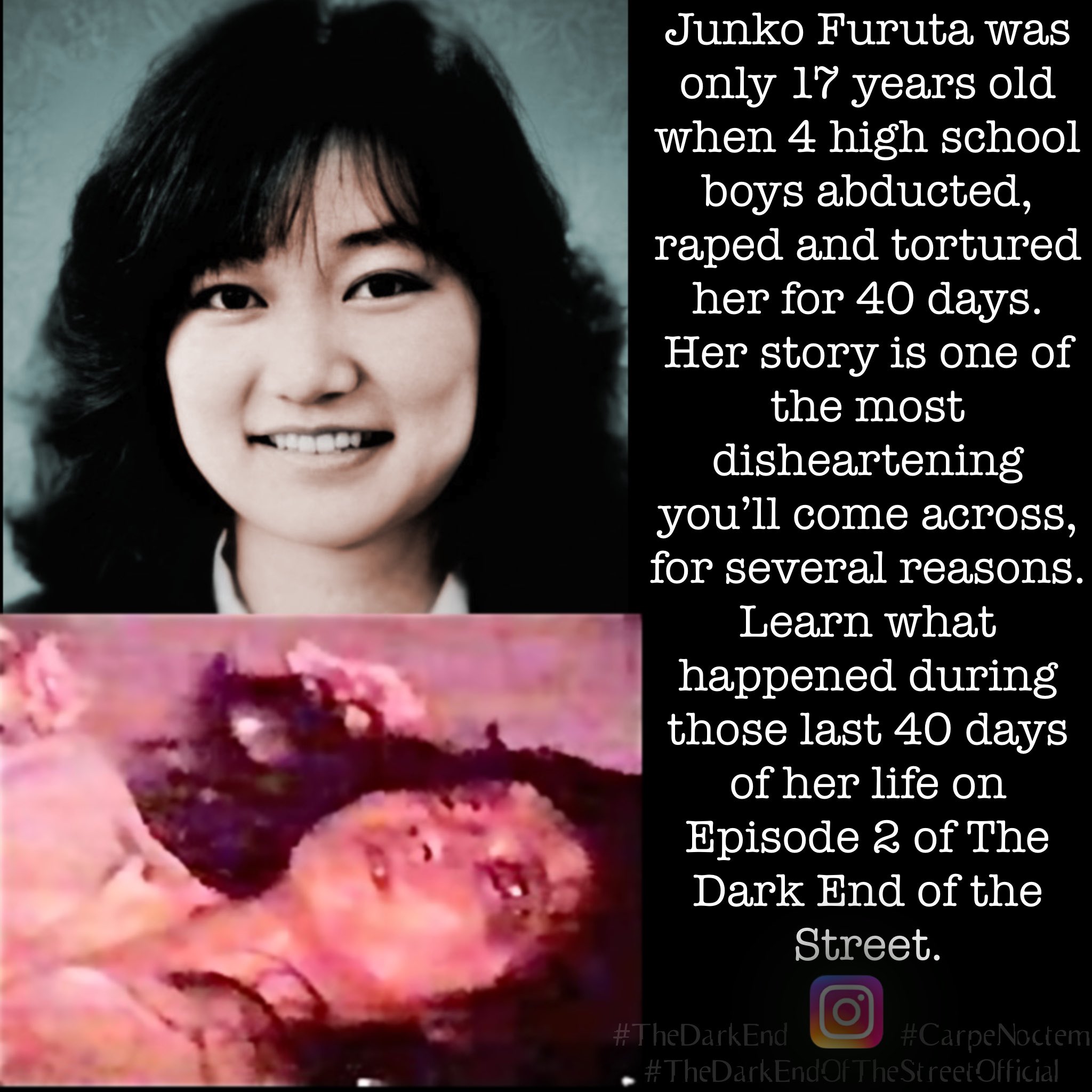The name Junko Furuta resonates deeply with those who seek to understand the darker aspects of human behavior and societal failures. Her tragic story, which unfolded in Japan during the late 1980s, continues to evoke strong emotions and serves as a stark reminder of the vulnerabilities faced by individuals in society. This article delves into the harrowing details of Junko Furuta's life, the events leading to her untimely death, and the broader implications for justice, safety, and societal values. Junko Furuta's case is not just a story of personal tragedy but also a pivotal moment that sparked discussions on crime, victim protection, and systemic accountability. Her legacy continues to influence advocacy efforts and policy reforms aimed at preventing similar atrocities.
Born on November 22, 1970, Junko Furuta was an ordinary high school student whose life took a devastating turn due to the actions of others. Her case became one of the most shocking and widely discussed criminal incidents in modern Japanese history. The brutality she endured and the subsequent handling of her case by authorities ignited public outrage, leading to significant changes in how similar cases are addressed. Understanding Junko Furuta's story is crucial for recognizing the importance of protecting vulnerable individuals and ensuring justice is served.
This article will explore various aspects of Junko Furuta's life and death, examining the circumstances surrounding her abduction, the details of her captivity, and the legal proceedings that followed. Additionally, we will analyze the societal impact of her case, including its influence on media coverage, public awareness, and legislative reforms. By providing comprehensive insights into these topics, this article aims to honor Junko Furuta's memory while contributing to ongoing conversations about safety, justice, and human rights.
Read also:Fortnite Unblocked How To Play Without Restrictions And Stay Safe Online
Table of Contents
- Biography of Junko Furuta
- Personal Data and Biodata
- The Abduction and Captivity
- Details of the Brutality Endured
- Legal Proceedings and Outcomes
- Impact on Media and Public Awareness
- Societal Changes and Reforms
- Advocacy and Support Movements
- International Perspective and Comparisons
- Conclusion and Call to Action
Biography of Junko Furuta
Junko Furuta was born on November 22, 1970, in the city of Misato, Saitama Prefecture, Japan. She grew up in a typical Japanese household, attending local schools and leading what appeared to be an ordinary life. Her early years were marked by academic pursuits and friendships typical of a high school student. Junko was known for her quiet demeanor and dedication to her studies, traits that made her a respected member of her community.
As Junko entered her teenage years, she began to show interest in various extracurricular activities, including sports and cultural clubs. Her involvement in school events and community gatherings highlighted her commitment to personal growth and social engagement. Despite her reserved nature, Junko was well-liked by her peers and teachers, who often praised her diligence and kindness. These qualities would later make her tragic fate even more poignant to those who knew her.
Junko's aspirations extended beyond her immediate environment, as she dreamed of pursuing higher education and contributing positively to society. Her academic performance reflected her ambitions, and she was on track to achieve her goals. However, the promising trajectory of her life was abruptly halted when she became a victim of one of the most heinous crimes in Japanese history. Understanding Junko's background provides context for the profound impact her story has had on public consciousness and policy reforms.
Personal Data and Biodata
| Attribute | Details |
|---|---|
| Full Name | Junko Furuta |
| Date of Birth | November 22, 1970 |
| Place of Birth | Misato, Saitama Prefecture, Japan |
| Parents | Mr. and Mrs. Furuta |
| Education | Local schools in Misato |
| Interests | Sports, cultural clubs, academic pursuits |
The Abduction and Captivity
On November 25, 1988, Junko Furuta's life took a tragic turn when she was abducted by a group of four teenage boys. The abduction occurred after Junko left her part-time job, intending to return home. Unbeknownst to her, she was being followed by the perpetrators, who had planned the abduction meticulously. The group, led by Hiroshi Miyano, lured Junko into a van under false pretenses and transported her to a house in Ayase, Tokyo, where she would be held captive for over 40 days.
During her captivity, Junko endured unimaginable horrors at the hands of her captors. The house where she was held became a site of relentless torture and abuse. Her captors subjected her to physical violence, sexual assaults, and psychological torment, often recording their actions as a form of intimidation. Despite her pleas for help and attempts to escape, Junko remained trapped, isolated from the outside world, and subjected to continuous degradation.
Conditions of Captivity
- Physical Restraints: Junko was often bound with ropes and chains, preventing her from moving freely or attempting to flee.
- Isolation: The house was soundproofed, ensuring that her cries for help went unheard by neighbors or passersby.
- Surveillance: Her captors maintained constant watch over her, using threats and violence to enforce compliance.
The conditions of Junko's captivity highlight the calculated nature of her abductors' actions. Their intent was not only to inflict harm but also to exert complete control over her life. This level of premeditation and cruelty underscores the severity of the crime and the profound impact it had on public perception and legal responses.
Read also:Securely Connect Remote Iot Vpc Aws Not Working On Windows A Comprehensive Guide
Details of the Brutality Endured
The brutality endured by Junko Furuta during her captivity is difficult to comprehend. Her captors inflicted a range of physical and psychological abuses that left lasting scars on her body and mind. Among the most harrowing aspects of her ordeal were the repeated instances of sexual violence, which occurred multiple times daily. These assaults were not only acts of physical domination but also served to degrade and dehumanize Junko, stripping away her dignity and sense of self-worth.
In addition to sexual violence, Junko suffered extensive physical injuries. Her captors used various implements to inflict pain, including burning her with cigarettes, beating her with blunt objects, and cutting her with knives. These acts of torture were often accompanied by verbal abuse and threats, further exacerbating her psychological trauma. The cumulative effect of these abuses left Junko in a state of constant fear and despair, making any hope of escape seem impossible.
Psychological Impact
- Isolation: Being cut off from the outside world intensified Junko's feelings of helplessness and abandonment.
- Trauma: The repeated exposure to violence and abuse led to severe psychological trauma, affecting her mental health profoundly.
- Dehumanization: The systematic degradation of Junko's humanity through verbal and physical abuse left deep emotional scars.
Understanding the full extent of the brutality Junko endured is essential for recognizing the gravity of her situation and the failures of the systems meant to protect her. Her story serves as a stark reminder of the importance of safeguarding vulnerable individuals and holding perpetrators accountable for their actions.
Legal Proceedings and Outcomes
Following Junko Furuta's tragic death on January 4, 1989, the legal proceedings against her captors began. The case garnered significant attention due to its brutality and the public outcry it generated. The four perpetrators—Hiroshi Miyano, Yasushi Watanabe, Shinji Minato, and Jō Ogura—were arrested and charged with kidnapping, rape, and murder. Despite the overwhelming evidence against them, the trial process revealed systemic issues within Japan's legal framework, particularly concerning juvenile offenders.
One of the most controversial aspects of the case was the lenient sentencing of the perpetrators, three of whom were minors at the time of the crime. Under Japanese law, juvenile offenders are often treated more leniently than adults, a policy intended to provide rehabilitation opportunities. However, in Junko's case, this approach was widely criticized for failing to adequately address the severity of the crimes committed. Hiroshi Miyano, the ringleader, received a life sentence, while the other three received sentences ranging from 4 to 20 years in juvenile detention facilities.
Public Reaction and Legal Reforms
- Outrage: The public was outraged by the perceived leniency of the sentences, leading to widespread protests and calls for reform.
- Media Coverage: Extensive media coverage highlighted the inadequacies of the legal system, prompting discussions on juvenile justice.
- Policy Changes: In response to public pressure, Japan implemented several legal reforms aimed at addressing the treatment of juvenile offenders in severe cases.
The legal proceedings surrounding Junko Furuta's case underscore the complexities of balancing rehabilitation with accountability, especially in cases involving extreme violence. Her story continues to influence debates on juvenile justice and the need for systemic reforms to prevent similar tragedies.
Impact on Media and Public Awareness
Junko Furuta's case had a profound impact on media coverage and public awareness in Japan and internationally. The graphic nature of the crimes committed against her, coupled with the perceived failures of the legal system, sparked intense media scrutiny and public discourse. News outlets dedicated extensive coverage to the trial and its outcomes, often highlighting the discrepancies between public expectations and judicial decisions. This heightened media attention played a crucial role in shaping public opinion and driving demands for reform.
The case also served as a catalyst for increased public awareness regarding issues of violence against women and the vulnerabilities faced by young individuals. Advocacy groups and non-profit organizations leveraged the visibility of Junko's story to promote educational campaigns and policy changes aimed at enhancing victim protection and support services. Documentaries, books, and films inspired by Junko's ordeal further amplified these discussions, reaching audiences beyond Japan's borders and fostering global conversations on similar issues.
Media Influence
- Documentaries: Several documentaries explored the details of Junko's case, providing in-depth analyses and interviews with experts.
- Books and Films: Literary works and cinematic adaptations brought her story to wider audiences, emphasizing the need for societal change.
- Social Media: Platforms like Twitter and Facebook became spaces for advocacy, allowing individuals to share information and mobilize support.
The intersection of media coverage and public awareness in Junko Furuta's case demonstrates the power of storytelling in driving social change. By amplifying her story, media outlets and advocacy groups have contributed to ongoing efforts to prevent similar tragedies and promote justice for victims.
Societal Changes and Reforms
The aftermath of Junko Furuta's case led to significant societal changes and reforms in Japan, particularly in areas related to crime prevention, victim support, and legal accountability. The public outcry over the lenient sentences handed down to her captors prompted lawmakers to reevaluate existing policies and introduce measures aimed at addressing the shortcomings exposed by the case. One of the most notable reforms was the revision of Japan's juvenile justice laws, which sought to impose stricter penalties for severe crimes committed by minors.
Beyond legal reforms, Junko's story also spurred the establishment of various support systems for victims of violent crimes. Non-profit organizations and government agencies collaborated to create resources and programs designed to assist survivors and their families. These initiatives included counseling services, legal aid, and educational workshops aimed at raising awareness about violence prevention and victim rights. Additionally, advocacy groups worked tirelessly to ensure that Junko's legacy would contribute to a safer and more equitable society.
Key Reforms and Initiatives
- Juvenile Justice Reforms: Amendments to existing laws to address severe crimes committed by

